 New Delhi, October 24: India's home ministry Tuesday recommended the rejection of the mercy petition of Pakistani terrorist Ajmal Kasab, lone survivor among the 26/11 attackers, a government source said.
New Delhi, October 24: India's home ministry Tuesday recommended the rejection of the mercy petition of Pakistani terrorist Ajmal Kasab, lone survivor among the 26/11 attackers, a government source said.
The mercy petition made to the president by Kasab, after the Supreme Court Aug 29
upheld his death sentence, has been rejected and the recommendation in this regard forwarded to the president, the source told IANS.
A home ministry spokesman said briefly: "It (mercy petition) has been processed and submitted to the president."
Following the home ministry's recommendation, it is now left to President Pranab Mukherjee to take a decision on Kasab's mercy plea.
The Mumbai trial court had May 6, 2010 awarded death sentence to Kasab which was upheld by the Bombay High Court Feb 21, 2011. The apex court rejected his appeal Aug 29.
Kasab was one of the 10 Pakistani terrorists who sailed from their country and illegally sneaked into Mumbai on the night of Nov 26, 2008 for a terror siege of the city that ended Nov 29 afternoon. The mayhem that Kasab and his nine accomplices unleashed on the city claimed 166 innocent lives.
Reacting to the development, the Bharatiya Janata Party (BJP) demanded that the apex court decision awarding death sentence to Kasab should be implemented at the earliest.
BJP leader Mukhtar Abbas Naqvi said: "He (Kasab) had hatched a conspiracy against the country. It (his hanging) will be a lesson to those who consider India a soft target and indulge in terror activities."
He said it will be a befitting reply to forces in Pakistan who have been giving encouragement to terror activities against the country.
The apex court had rejected Kasab's contention that he was a mere tool in the hands of terror outfit Lashkar-e-Taiba.
"We are unable to accept the submission that the appellant was a mere tool in the hands of the Lashkar-e-Taiba. He joined the Lashkar-e-Taiba around December 2007 and continued as its member till the end, despite a number of opportunities to leave it," the top court had said.
The apex court said: "The primary and foremost offence by the accused (Kasab) was waging war against India."
"...in the facts of the case the death penalty is the only sentence that can be given to the appellant", the court said
"He kills without the slightest twinge of conscience," the court said.
"Unfortunately, he is wholly remorseless and any feeling of pity is unknown to him," the court said.






Comments
Add new comment